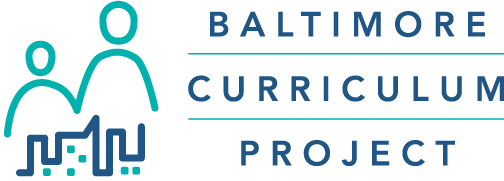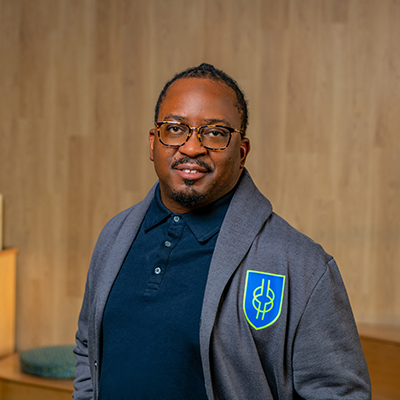Teaching and Learning at FES.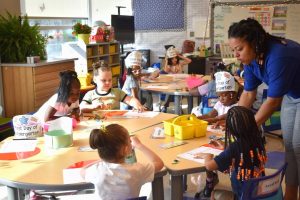
I believe, though, that the rewards of teaching have never been greater. And that the role of school leadership has never been more critical as we work to attract new teachers and staff to teach in public schools.
The teacher support program we’ve put in place at Frederick Elementary School (FES) in Baltimore, where I have been principal since 2017, has helped FES buck national retention trends and, most importantly, helped our students and community thrive.
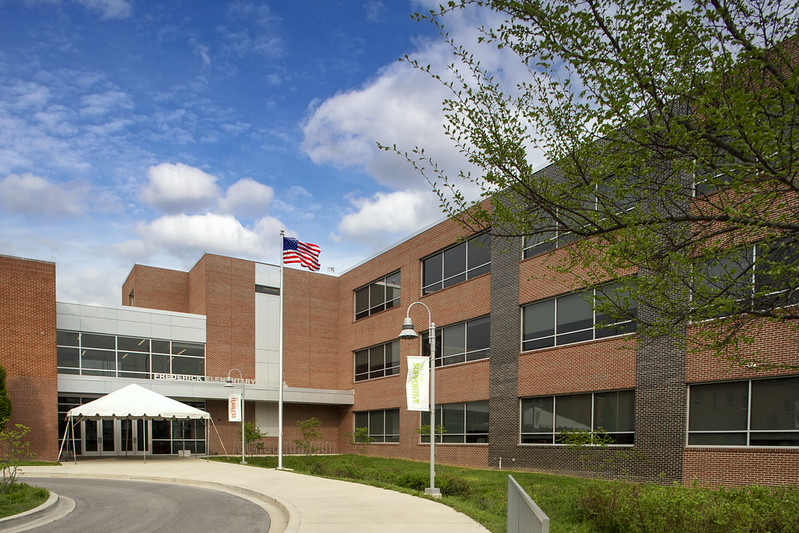
Creating the Right Environment for Teaching and Learning
In 2016, FES was struggling. It was one of the lowest-performing elementary schools in the Baltimore City Public Schools system. Though FES is in one of Baltimore’s historic neighborhoods, it was (and is) a high-need community.
In 2017 City Schools supported the Baltimore Curriculum Project (BCP) in taking on FES as one of its neighborhood conversion charter schools. BCP, Maryland’s largest and oldest charter school organization, operates six public schools in Baltimore. At that same time I joined FES as its Principal with the added challenge of absorbing Samuel F.B. Morse Elementary into FES when it became a BCP school.
Since then, we have addressed a number of City Schools’ educational priorities by raising achievement and providing 21st-century learning experiences in a renovated building. Developing and supporting exceptional teachers, administrators, and staff are central to everything FES does for its students and families.
Being Intentional with Hiring
 Intentionality in the hiring process is essential. One of the challenges of converting and merging two schools was that there were so many things to address and develop in the months leading up to opening that hiring, while important, was a bit rushed as we wanted to fill positions quickly in order to not have gaps on opening day.
Intentionality in the hiring process is essential. One of the challenges of converting and merging two schools was that there were so many things to address and develop in the months leading up to opening that hiring, while important, was a bit rushed as we wanted to fill positions quickly in order to not have gaps on opening day.
Plus, the culture that we wanted to establish at FES was purely theoretical at that point. There was no lived experience to measure a candidate to determine fit or not. In year two, however, we revamped the whole hiring process. This included:
- Multiple touch points from various perspectives from leadership as well as teachers and support staff
- Interview questions that aligned with what we knew would make someone successful in our culture having had the benefit of living it out for a year
- Demonstration lessons, a crucial piece for teacher candidates to see the interaction with our students
Since then, we have continually honed that process, including the questions, as our learning environment has evolved. The results are evident in our teacher retention rates. We have a knack for gleaning whether a candidate will be a good fit for our community.
Since we are so focused on developmental needs of staff, we also are able to be self-reflective in the hiring process to know whether or not we have the capacity to coach and support a candidate who may not present as strong as others. The hiring process sets the tone for the candidate. Many often express how nervous the process made them but also how they felt supported and cared for even in the vetting.
Read more about BCP’s Teacher and School-based Staff Job Fair on March 25 at Govans Elementary School.
Creating a High Faculty Retention Rate
A shared commitment to FES mission and core values unite faculty and staff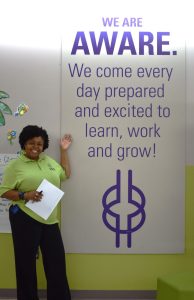
One of the results of this type of leadership approach is a feeling of ownership, agency, and safety among the staff. I view this as important in any working environment, especially one as complex as public education.
Another major idea underpinning the leadership model at FES is support. As leaders, we must provide the appropriate levels of support to staff that matches the level of challenge that empowerment and autonomy can often bring. We don’t want to give staff all of this responsibility and freedom without also being intentional about providing appropriate levels and types of support that each individual will need in order to be successful.
This has proven to be a good formula for staff retention at FES. Over the six-year period since the conversion and merger, we’ve achieved a retention rate of 86% across all faculty and staff positions. This number increases to 97% for employees of color.
Using the Holding Environment Theory to Support Teachers
Harold Henry (center) and FES students and staff.
The holding environment generally alludes to how organizations—schools in our case—create spaces of emotional and psychological safety for employees to grow. This has been especially important for us because the overwhelming majority of our staff began their careers in education at FES. Prior to the pandemic, this was an essential element in how we held onto staff. It’s increasingly important as we move to the other side of the pandemic while still dealing with the lingering effects of changed and changing attitudes toward work and the workplace.
I wish I knew a great innovation to overcome this challenge. We have not been completely immune to the loss of staff after returning to in-person school. Having the concept of establishing and maintaining a strong holding environment for staff as such an integral part of our DNA has helped us engage in conversations with staff about their experiences and feelings about the work from a place of trust. There is trust that our efforts to support them are real, and that goes a long way.
On a more practical note, we have tried various strategies like establishing a staff wellness suite where we brought in recliners and set up water features, diffusers, and sound machines to create quiet spaces for staff who may need to step away from the work for a few minutes. We’ve also scheduled wellness activities on some of our half-days where we’ve brought in individuals to provide information and services geared toward helping staff develop stress-relieving strategies and activities. Those things help, but the real work is in how we make staff feel safe, valued, seen, and heard every day.
BCP Support for Teachers and Staff
 BCP has an established foundation of support for teachers, which is one of the reasons why my leadership model integrates so well into the BCP family. It starts with their support of principals in securing resources and thinking through innovative and intentional strategies to support staff. I meet regularly with my five BCP principal colleagues, and although our schools are very different, we have similar challenges and successes with our teachers and staff. It’s great to have a sounding board with such experienced school leaders.
BCP has an established foundation of support for teachers, which is one of the reasons why my leadership model integrates so well into the BCP family. It starts with their support of principals in securing resources and thinking through innovative and intentional strategies to support staff. I meet regularly with my five BCP principal colleagues, and although our schools are very different, we have similar challenges and successes with our teachers and staff. It’s great to have a sounding board with such experienced school leaders.
The focus from BCP on supporting staff means we can effectively deliver the curriculum. Aside from feeling safe, I believe teachers want to feel they are being successful as well. Each BCP school has full-time academic coaches, who are extremely knowledgeable and capable in delivering the curriculum. This takes pressure off of struggling teachers and veteran teachers who are grappling with finding new ways to engage with the content and with students in the post-pandemic classroom.
FES coaches, like all BCP coaches across all the schools, provide direct in-classroom support and follow-up with individual and group/team support to teachers. A hallmark of the FES model is the lens of developmental theory that stresses individualized coaching based on the teacher’s dominant way of making meaning of their lived experience.
Driving Principles for Effective Schools Leadership
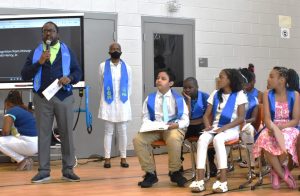
Harold Henry speaks at the
2022 5th Grade Closing Ceremony.
There will always be challenges in public education, especially in historically under-served communities. However, focusing on exploring the hidden, and sometimes not yet formed, opportunities to leverage resources and effect change is essential to not only success, but to keeping the will to continue the work.
One ideal that I live by is taken from Peter Drucker. It basically says starve problems and feed opportunities. I approach every challenge from this perspective, which has allowed me to lead and learn through complexity at every level.
A few of the driving principles I’ve used to be effective in leadership are understanding that:
- Complexity is ever present in this work
- Self-awareness and reflection are powerful tools for learning and leading
- Context always matters
- Human beings are capable of tremendous things when given the appropriate challenges and supports (this goes for staff and students)
- If you focus on developing and taking care of people, your organization will thrive
I didn’t expect to learn this as a school leader. In fact, I did not intend to be in education. Like many people, I entered the profession with the thought that it would be temporary while I figured out my “real” path. While I have always had great respect for teachers, I wanted to pursue business and marketing and thought I would teach until I found the right job.
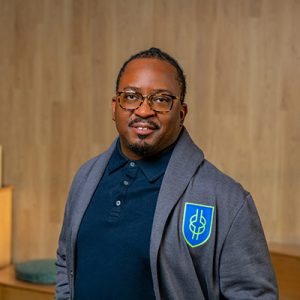
Harold S. Henry, Jr.
Principal, Frederick Elementary School
It took just six months for me to realize I was already in the right field and I was an educator. I taught at Northwestern High School in Baltimore in the Business, Finance, and Management Academy for four years before joining a middle school as its business manager. This led to work in the Baltimore City Schools’ central office and a stint with a charter school in Washington, DC.
When I returned to City Schools as a Team Lead with the School Support Networks, I had opportunities to work with and learn about all departments and offices in the district, formulating a more global view of schools from a systemic level. From this, I was introduced to BCP schools and leadership, which resulted in my appointment as FES Principal.
On July 1, 2023, I will begin a new opportunity as BCP’s first-ever Chief of Schools. I believe the integrity and effectiveness of my work are what fuel the confidence from BCP’s leadership and Board to offer me this new appointment.
I look forward to the challenges ahead.
Join me at the BCP’s Teacher and School-based Staff Job Fair on March 25 at Govans Elementary School to learn more about how we support teachers and the rewards of being part of the BCP community.
Contact me at hshjr@wearefrederick.org
